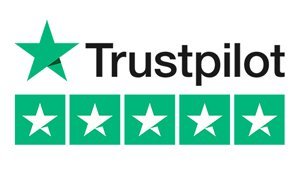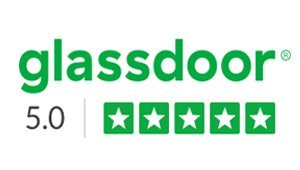SEO tools are pivotal in analysing and improving your website’s visibility and performance. Whether you’re managing a WordPress site, a Shopify store, or any other platform, free SEO tools can offer powerful insights. In this guide, we’ll explore 30 free SEO tools for website analysis and audits, detailing their features, pros and cons, system requirements, and any additional pricing.
What are SEO Tools?
Search Engine Optimisation Audit tools help you in analysing the SEO of your website. These tools provide essential metrics such as page rankings, CTR, bounce rate, and organic and paid traffic. These metrics are important to analyse the performance of your website so that you can make informed decisions regarding your SEO strategy. A good SEO strategy aims to drive organic traffic by making your site visible and more accessible. To prepare a good SEO strategy, you need real-time data, for which you can use SEO audit tools.
Why is SEO Important for Websites?
- Increased Visibility and Traffic: Higher website ranking means more visibility that will drive potential customers to your website. Users trust search engines; being on the first page of results improves your credibility.
- Cost-effective Marketing: SEO brings in organic traffic without needing paid ads, making it cost-efficient to grow your business over time.
- Improved User Experience: SEO practices like page speed and mobile optimisation help make the website more user-friendly. This, in turn, reduces bounce rates and improves conversions.
- Builds Credibility: Being ranked on the first page of search results builds trust and authority with users. They will likely believe your website is reliable and relevant to their queries.
- Targeted Traffic: SEO allows you to attract users specifically searching for products or services you offer. Targeted traffic often leads to higher conversion rates.
30 Free SEO Tools for Website Audit
1. Google Search Console

Google Search Console allows you to monitor, maintain, and troubleshoot your site’s presence in Google search results. It is one of the best tools available on the G Suite to help you achieve your SEO goals.
- Pros:
- Google Search Console provides direct insights from Google. Which means it provides the most reliable data.
- The tool has a simple interface and is very easy to use.
- Cons:
- Limited features compared to paid tools.
- No backlink analysis.
System Requirements: It can run on any system as it is Web Based.
Price: Free
2. Google Analytics

Compared to the search console, Google Analytics provides in-depth information. Google Analytics provides detailed insights into user behaviour, traffic sources, and more.
- Pros:
- Provides in-depth traffic and audience analysis.
- Easy to integrate with other Google tools.
- Cons:
- The tool can be hard to use for newcomers.
- Sometimes, the tool can be overwhelming as it contains lots of data.
System Requirements: Web-based.
Price: Free
3. Ahrefs Webmaster Tools
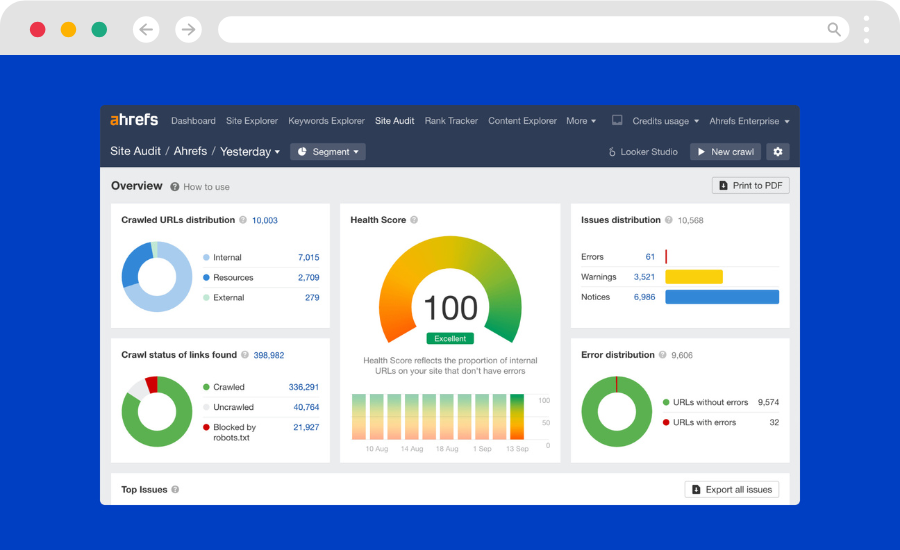
A free version of Ahrefs that allows users to monitor backlink profiles and the website’s SEO performance.
- Pros:
- Ahrefs Webmaster tool provides comprehensive backlink analysis. This means you can filter out toxic links easily, maintaining the site’s credibility.
- Insight into organic keyword performance, along with competitor analysis.
- Cons:
- Limited access compared to paid Ahrefs plans.
- No in-depth competitor analysis.
System Requirements: Web-based.
Price: Free
4. Moz Link Explorer
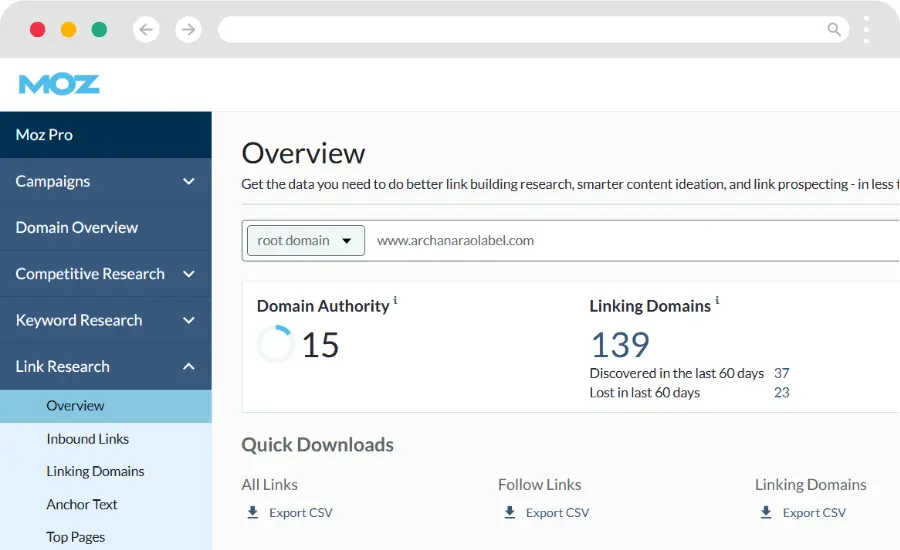
Moz’s free tool for checking your website’s backlink profile, domain authority, and many other metrics.
- Pros:
- Moz Link has a very easy-to-use and simple interface, which makes it the ideal tool for all newcomers.
- Moz Link provides one of the most accurate domain authority metrics.
- Cons:
- The free version has limited access to advanced features.
- Fewer links compared to Ahrefs.
System Requirements: Web-based.
Price: Free for basic features.
5. Ubersuggest
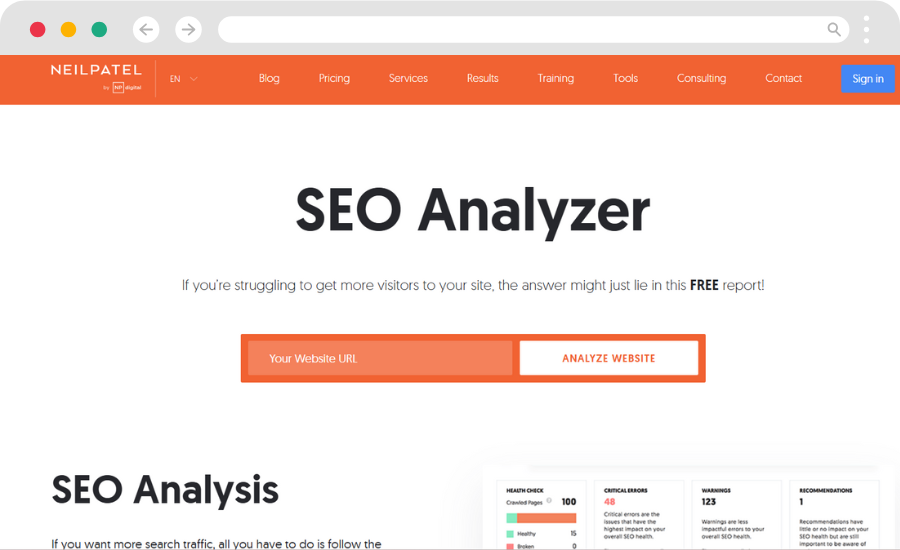
Ubersuggest is a free tool by Neil Patel. It is a great tool for keyword research, SEO audits, and backlink analysis.
- Pros:
- Ubersuggest has one of the most easy-to-use interfaces.
- The tool is a great option for beginners in the SEO field.
- Cons:
- Limited keyword data.
- Some features behind a paywall.
System Requirements: Web-based.
Price: Free for basic usage.
6. SEMrush SEO Writing Assistant
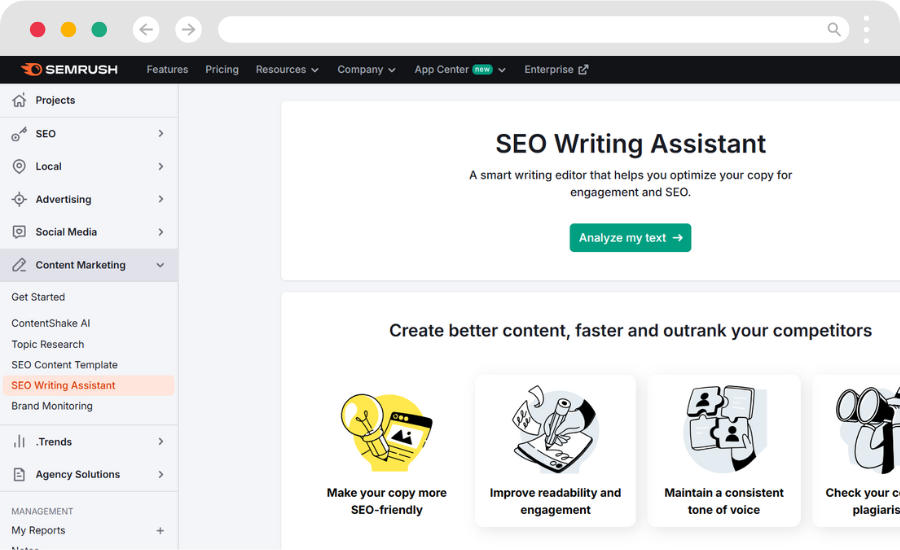
Description: Helps improve on-page SEO with content optimisation suggestions based on top-performing competitors.
- Pros:
- In-depth content optimisation tips.
- WordPress plugin available.
- Cons:
- Limited without a paid SEMrush account.
- Focuses only on content.
System Requirements: Web-based, WordPress plugin available.
Price: Free for basic features.
7. Screaming Frog SEO Spider
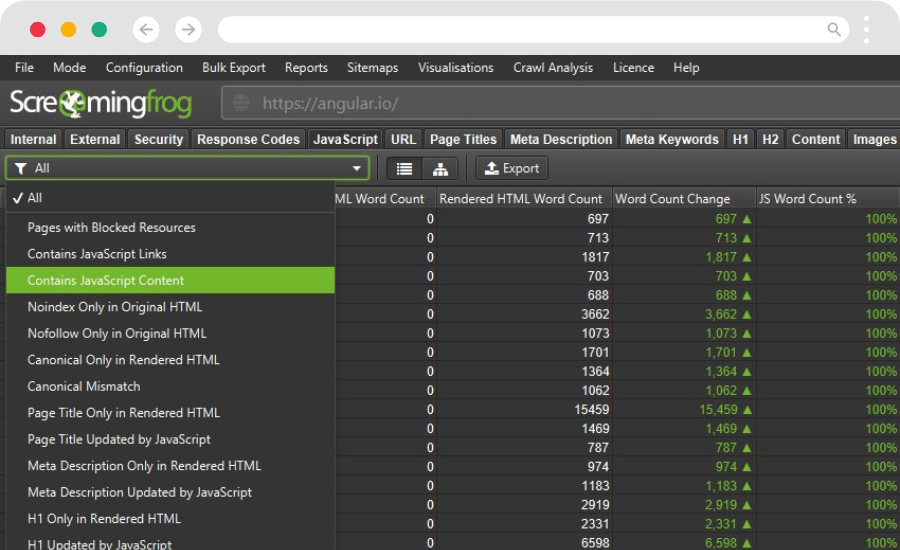
A powerful desktop-based tool for technical SEO audits that crawls websites and checks for common SEO issues.
- Pros:
- The tool has comprehensive site audit capabilities, providing you with every SEO metric you need.
- Identifies duplicate content, broken links, and more.
- Cons:
- The free version limits you to 500 URLs.
- Desktop-based, not cloud-based.
System Requirements: Windows, macOS, or Ubuntu.
Price: Free for 500 URL audits.
8. GTmetrix
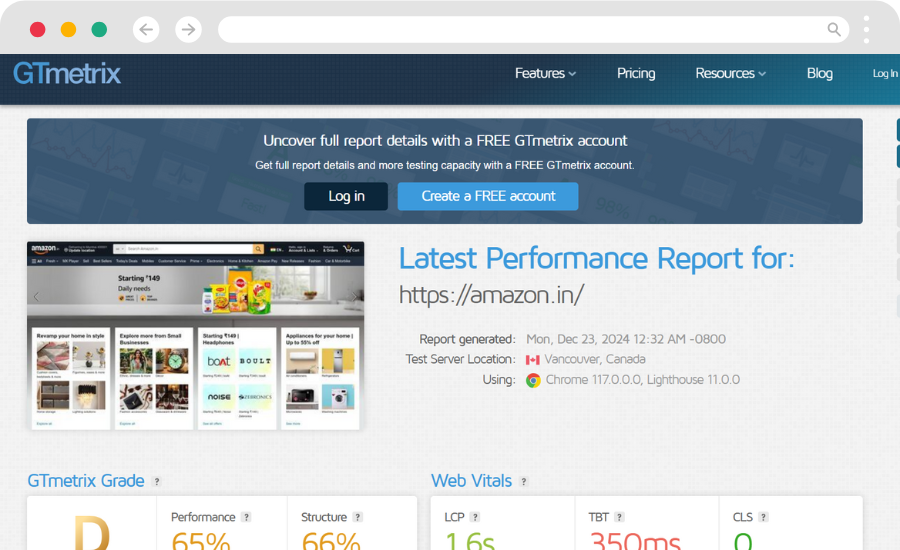
A performance analysis tool that helps you understand and improve your website’s speed.
- Pros:
- Detailed performance reports.
- Offers actionable suggestions to improve site speed.
- Cons:
- Limited options in the free version.
- Does not offer SEO keyword analysis.
System Requirements: Web-based.
Price: Free for basic use.
9. Yoast SEO (WordPress Plugin)
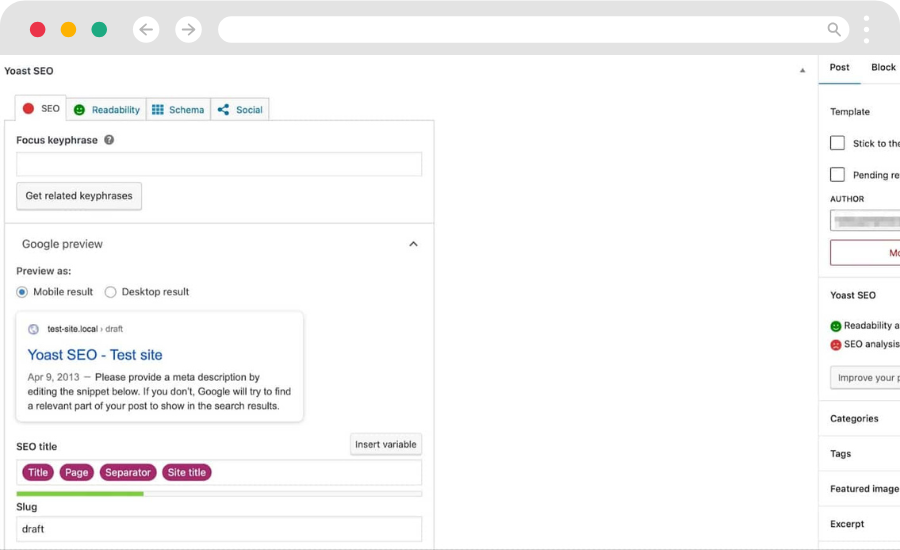
A popular WordPress plugin for on-page SEO, helping with meta descriptions, readability, and more.
- Pros:
- Yoast is a straightforward and easy-to-use tool.
- The tool offers real-time SEO analysis, meaning you don’t have to make any changes once the page goes live.
- Cons:
- Limited to WordPress sites. You can’t use it on other platforms.
- The free version lacks advanced features.
System Requirements: WordPress.
Price: Free, with a premium version.
10. SEOptimer
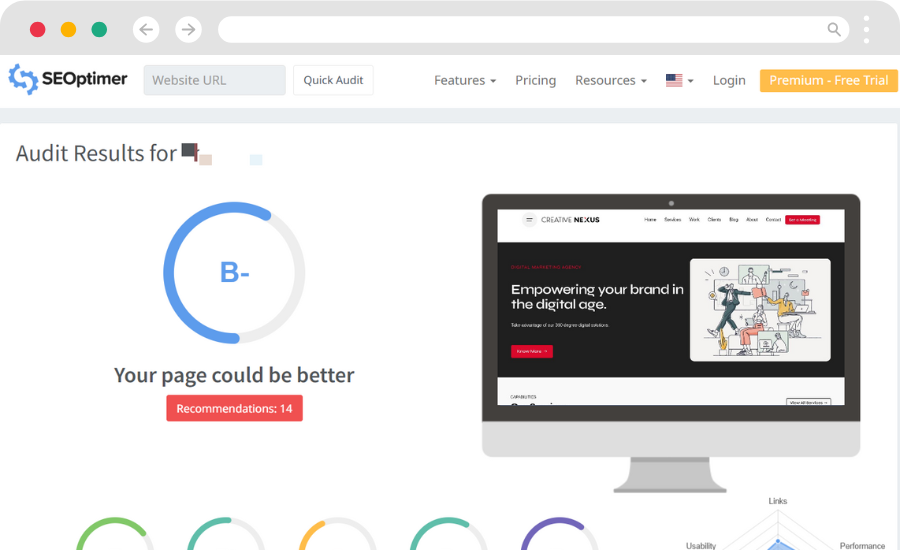
A straightforward website audit tool offers suggestions for improving on-page SEO, usability, and social metrics.
- Pros:
- SEOptimer is very quick and easy to use.
- It also provides visual recommendations.
- Cons:
- The tool offers limited customisation, which is why this tool is not great for some advanced work.
- The tool provides only basic SEO metrics.
System Requirements: Web-based.
Price: Free.
11. Bing Webmaster Tools
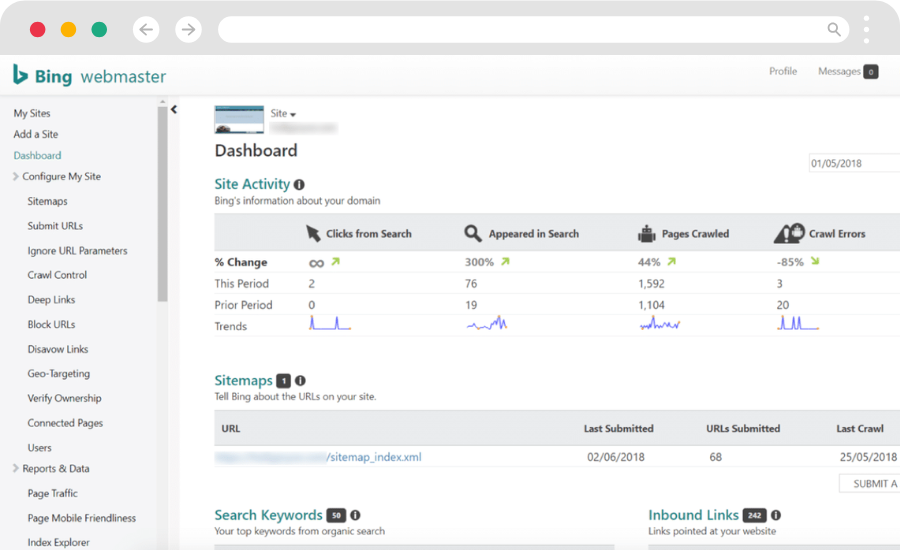
A free tool provided by Microsoft to help you analyse your website’s performance on the Bing search engine.
- Pros:
- Provides detailed data on Bing search traffic.
- The tool is free for all users.
- Cons:
- Less relevant for websites focusing on Google.
- Limited insights compared to Google Search Console.
System Requirements: Web-based.
Price: Free.
Suggested Read:
12. Keyword Hero
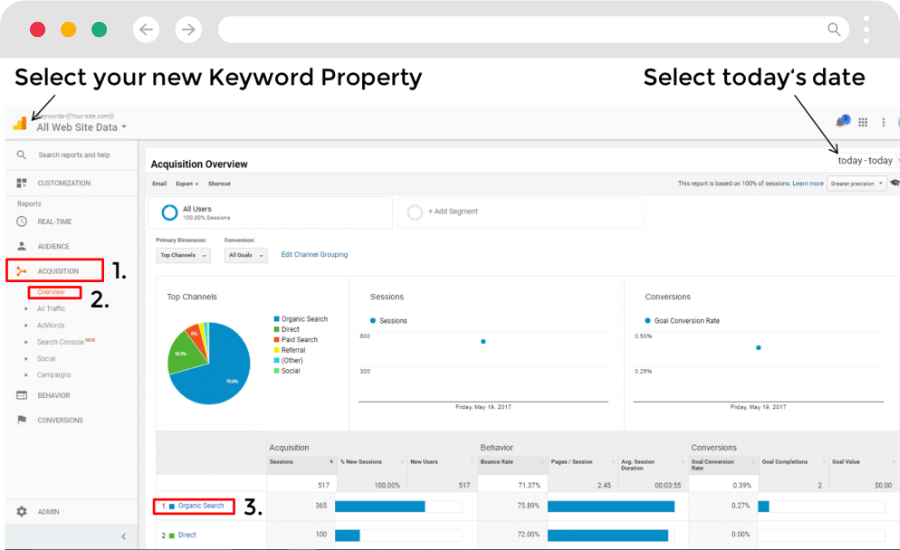
A Google Analytics add-on that shows you the exact keywords that brought visitors to your site.
- Pros:
- Restores missing keyword data in Google Analytics.
- The tool is very easy to integrate with different platforms.
- Cons:
- Keyword Hero and limited free usage.
- The biggest drawback is that it doesn’t provide real-time data.
System Requirements: Web-based.
Price: Free for up to 2,000 sessions per month.
13. Woorank
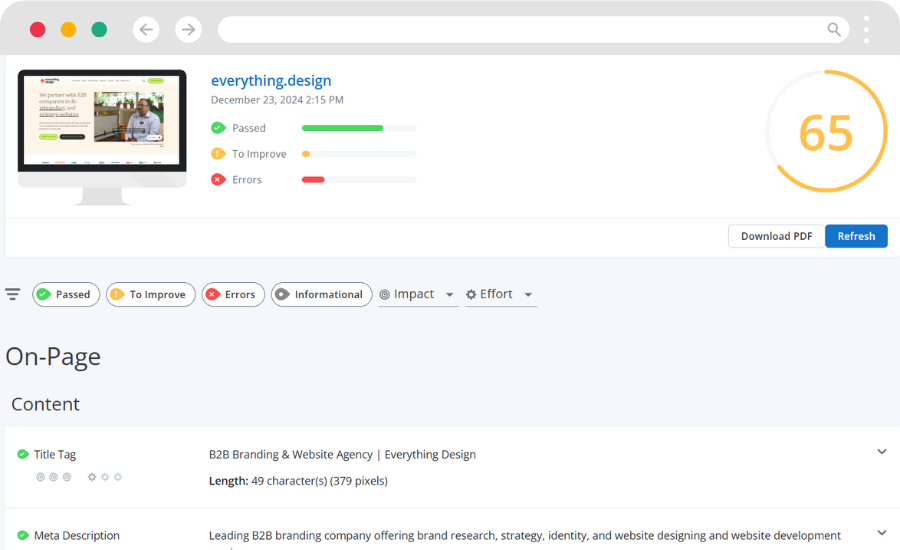
Woorank provides in-depth website reviews, evaluating SEO, mobile responsiveness, and more.
- Pros:
- The tool is easy to use and great for beginners.
- It also offers comprehensive SEO checklists.
- Cons:
- Limited audits are available in the free version.
- Expensive for advanced features.
System Requirements: Web-based.
Price: Free with limited features.
14. SEO SiteCheckup
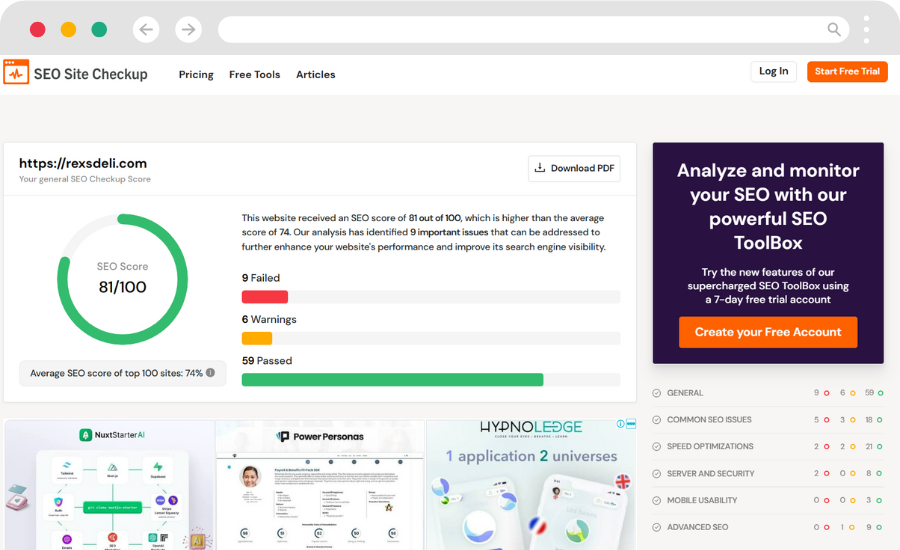
Provides comprehensive SEO audits with suggestions for improvement. You can use this to check how your SEO strategies are currently working.
- Pros:
- SEO SiteCheckup provides easy-to-read reports.
- Offers in-depth recommendations.
- Cons:
- The tool has a limited number of free reports.
- Some advanced features require payment.
System Requirements: Web-based.
Price: Free for basic features.
15. OpenLinkProfiler
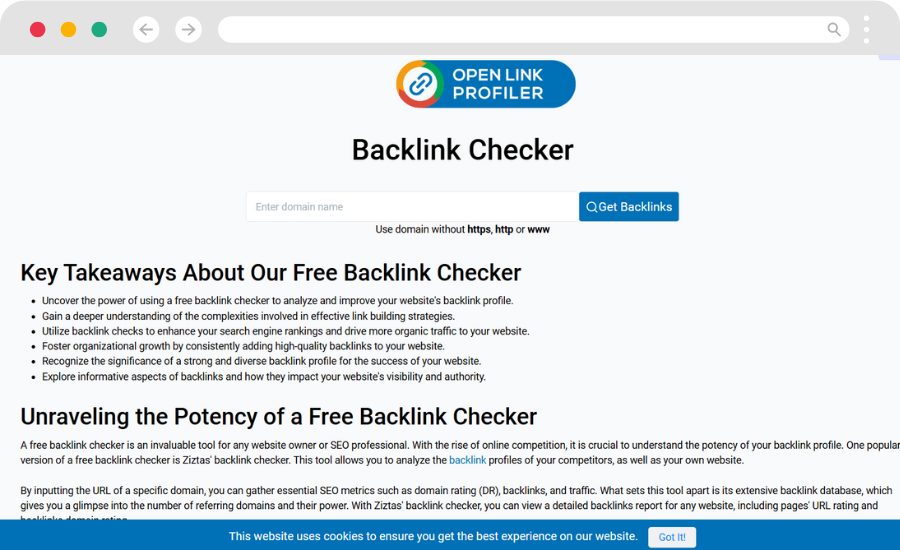
A free backlink analysis tool that provides insights into a website’s link profile. Backlinks are a great part of the website’s SEO strategy.
- Pros:
- The tool provides unlimited access to backlink data.
- Offers comprehensive link analysis.
- Cons:
- Less accurate compared to premium tools.
- Lacks other SEO metrics like keyword data.
System Requirements: Web-based.
Price: Free.
16. AnswerThePublic
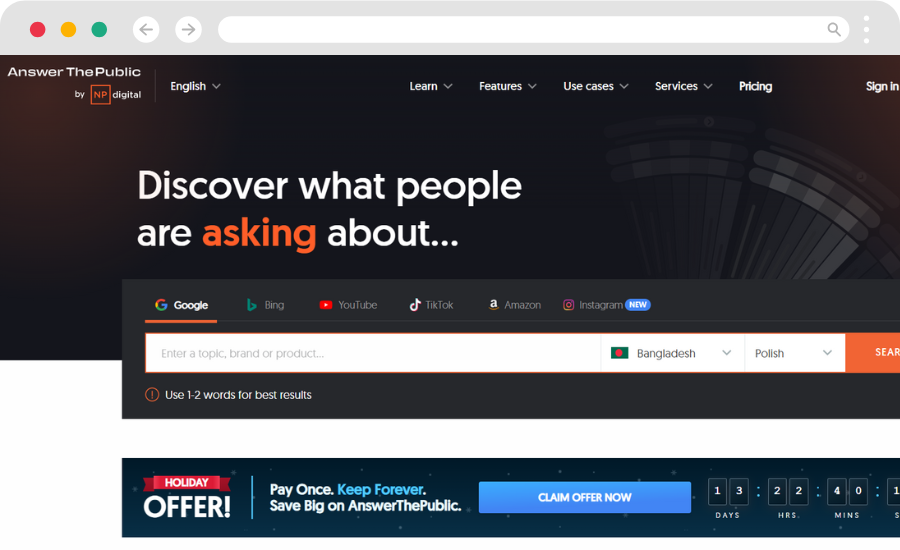
A keyword tool that visualises search queries and suggestions based on real-time data from search engines.
- Pros:
- Provide content ideas based on popular questions.
- User-friendly interface.
- Cons:
- Limited searches in the free version.
- Can be overwhelming with too many suggestions.
System Requirements: Web-based.
Price: Free with limited queries.
17. SEOquake
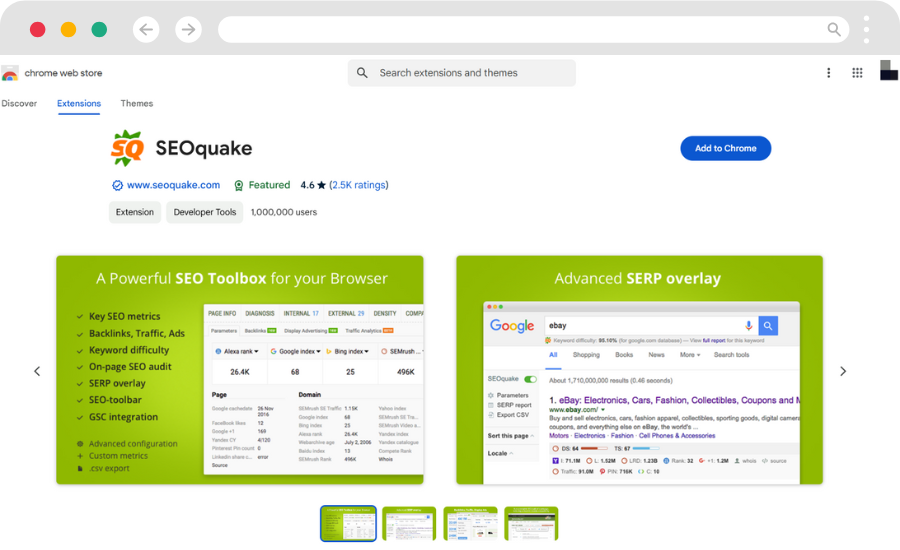
A free browser extension for Chrome and Firefox, offering instant SEO metrics for any website you visit.
- Pros:
- The tool is very easy to install and use.
- Provides real-time on-page SEO analysis.
- Cons:
- Limited features compared to standalone tools.
- Browser-based, so performance can slow down.
System Requirements: Browser-based (Chrome, Firefox).
Price: Free.
18. Varvy SEO Tool
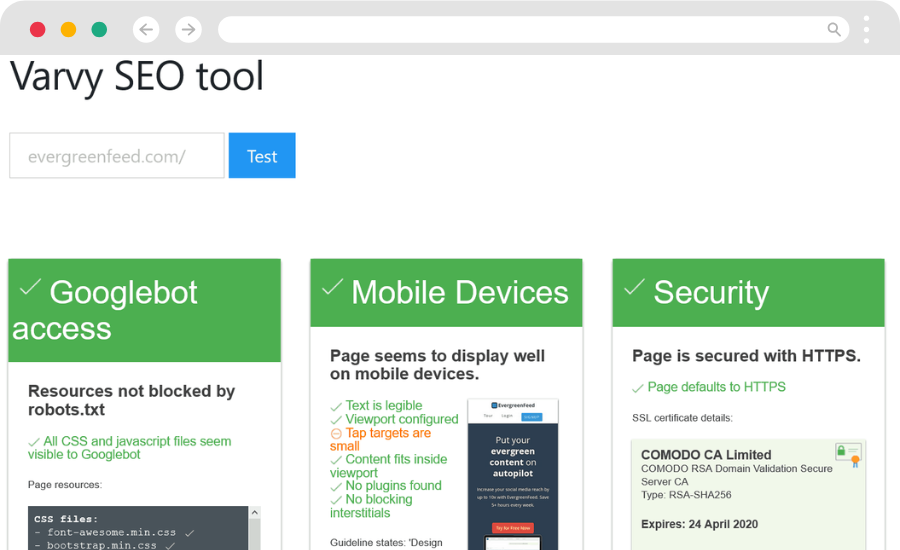
Varvy provides a comprehensive SEO audit with recommendations based on Google’s guidelines.
- Pros:
- Focuses on compliance with Google’s SEO guidelines, which many SEO tools don’t provide.
- Provides simple, clear reports.
- Cons:
- It doesn’t provide an in-depth analysis of your website’s SEO.
- Competitor analysis is a great part of your SEO strategy, and it’s missing from this tool.
System Requirements: It is a web-based tool compatible with the latest version of the top browsers.
Price: Free.
19. Robots.txt Generator by SEOBook
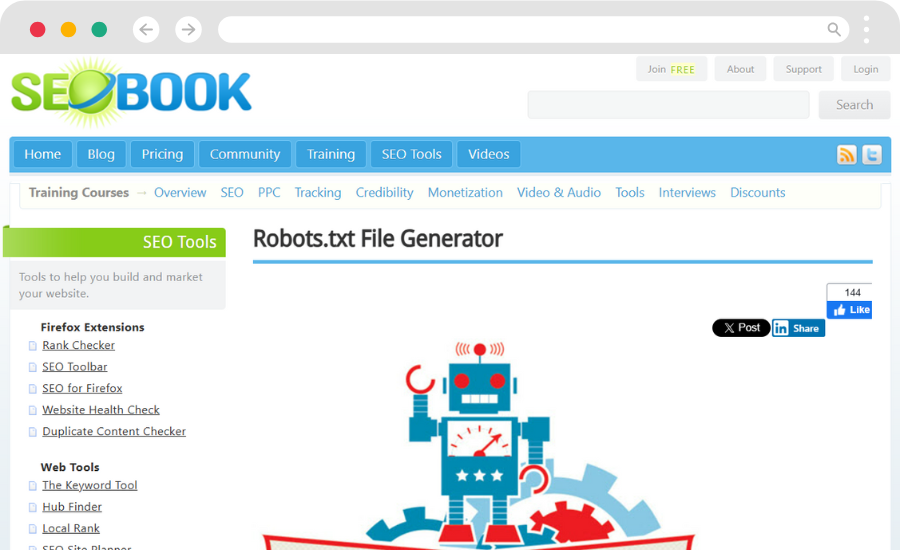
A simple tool to create and validate your robots.txt file to control how search engines crawl your website. This way, your pages can crawl faster and rank higher.
- Pros:
- Provides easy-to-generate robots.txt files for your website, which makes crawling faster.
- The tool also helps you to ensure proper indexing.
- Cons:
- Limited use outside of robots.txt file creation.
- No advanced features. It is only limited to robots.txt file creation.
System Requirements: The web-based tool can easily run on your browser.
Price: Free.
20. Penguin Tool
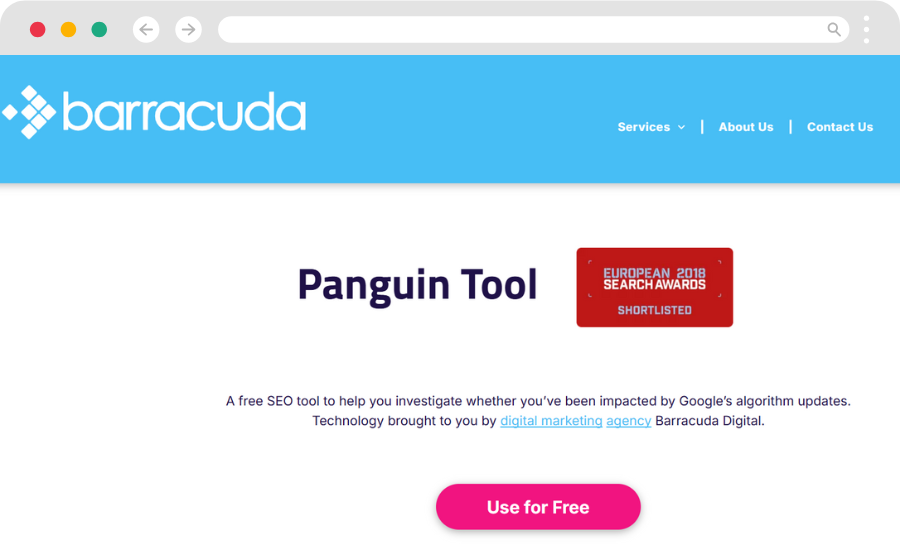
A free tool to identify if your site was affected by any of Google’s algorithm updates. This tool can help you cope with Google’s ever-changing algorithm.
- Pros:
- Easy to use and integrates with Google Analytics.
- The tool provides detailed algorithm impact analysis, which can help you to make necessary changes.
- Cons:
- Requires Google Analytics integration.
- Limited analysis for non-Google traffic.
System Requirements: You can easily run it in your browser as it’s web-based.
Price: Free.
21. XML Sitemaps Generator
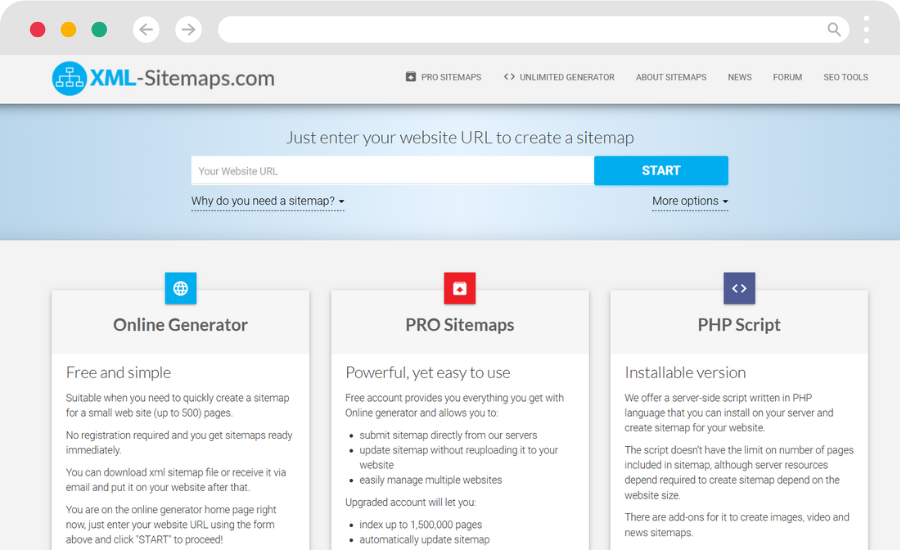
This tool helps you create XML sitemaps for your website, making it easier for search engines to crawl your site. It also helps you update any new page on your website.
- Pros:
- The tool generates simple, quick sitemaps.
- Free and unlimited usage.
- Cons:
- Does not provide advanced sitemap management.
- Limited to sitemap creation.
System Requirements: Web-based.
Price: Free.
22. SERPSim
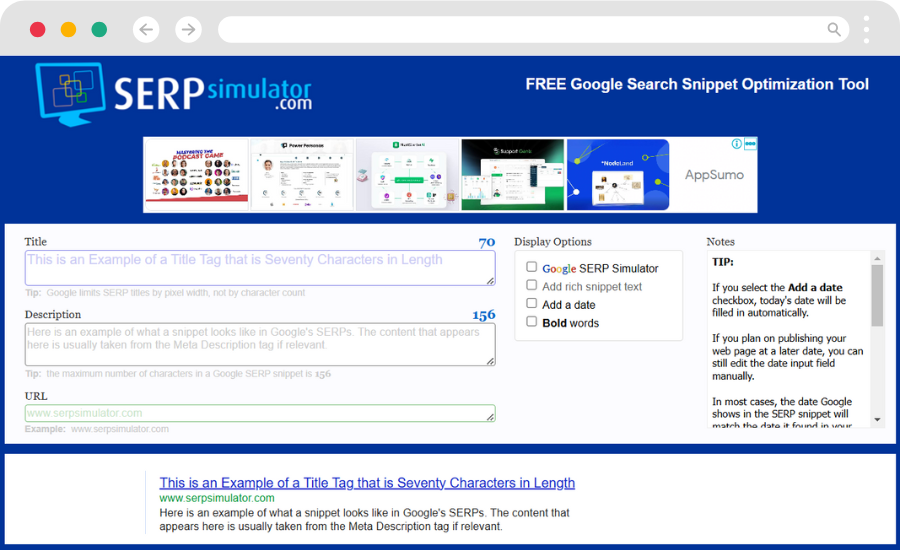
A tool that simulates how your meta title and description will appear in search engine results. This way, you can easily preview it and make necessary changes before making your page live.
- Pros:
- Provides a real-time preview of SERP snippets.
- Helps optimise meta titles and descriptions.
- Cons:
- Limited to meta information.
- No advanced SEO features.
System Requirements: Can easily run on the latest versions of the browsers.
Price: Free.
23. Sitechecker
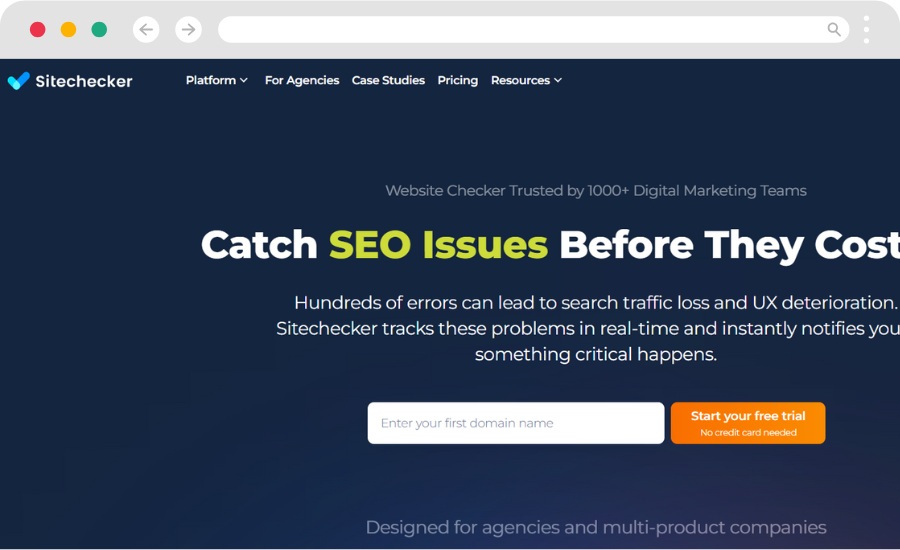
A free tool that provides a complete website audit, focusing on on-page SEO issues like meta tags and performance. It also provides necessary suggestions on how you can make changes.
- Pros:
- The Tool is user-friendly and provides detailed reports.
- Great tool for comprehensive on-page audit.
- Cons:
- Limited scans in the free version.
- No competitor analysis in the free tier.
System Requirements: Web-based.
Price: Free for basic audit.
24. Dareboost
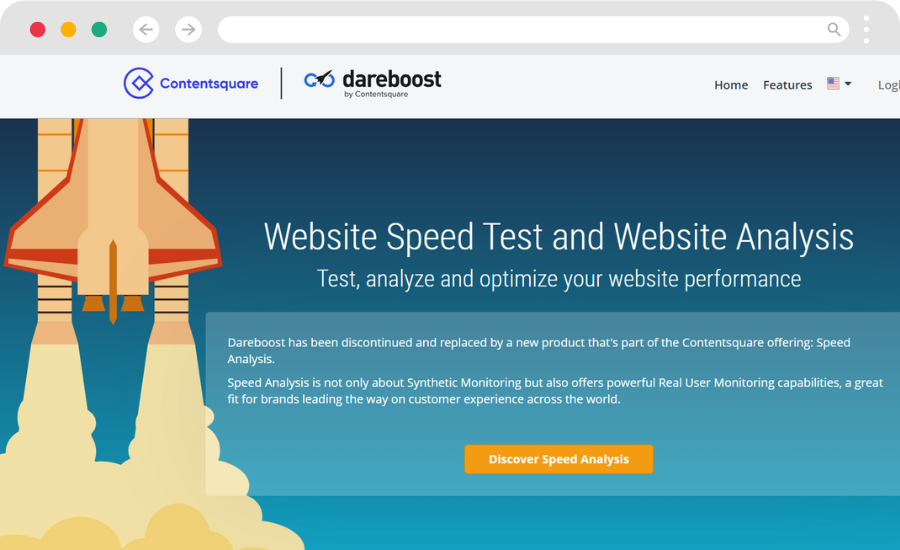
An all-in-one site performance analysis tool that checks your website for speed, security, and SEO issues. Also provides you with ideas to make your site better.
- Pros:
- Detailed page performance insights.
- Offers SEO recommendations that can help you increase your site’s performance.
- Cons:
- Limited to one free audit per month.
- Limited SEO data in the free tier.
System Requirements: Web-based.
Price: Free for one audit/month.
25. Mobile-Friendly Test by Google
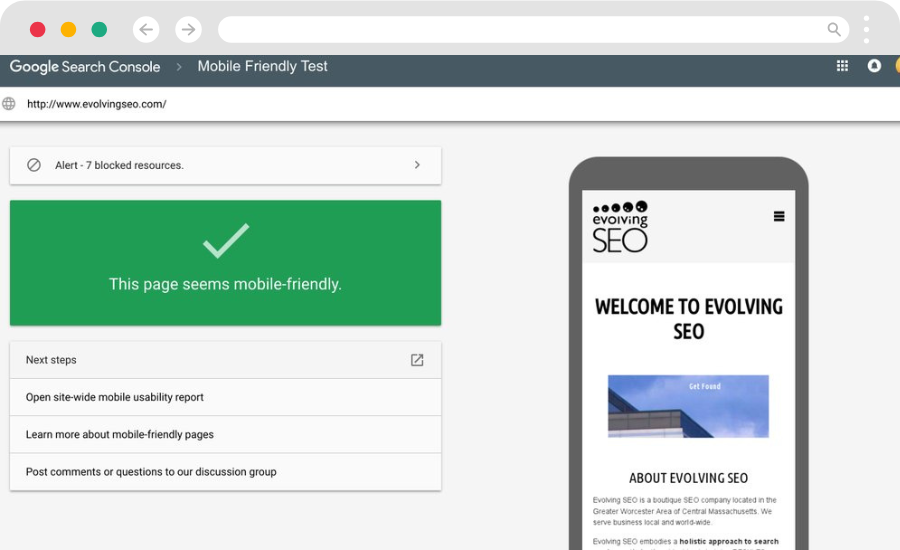
This tool tests how easily a visitor can use your page on a mobile device. Using this tool, you can easily check the responsiveness of the website.
- Pros:
- The tool provides direct insights from Google, which means it’s the most authentic information.
- Identifies mobile usability issues.
- Cons:
- Limited to mobile usability.
- Does not offer SEO metrics.
System Requirements: Web-based.
Price: Free.
26. Google PageSpeed Insights
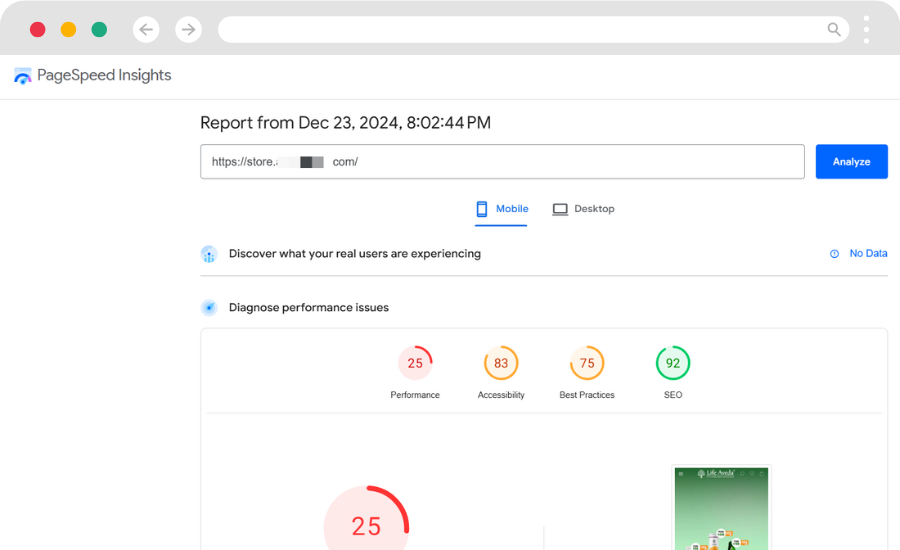
A performance analysis tool for assessing website speed and performance across devices.
- Pros:
- Provide actionable suggestions to improve speed.
- Direct insights from Google.
- Cons:
- Does not provide detailed SEO insights.
- Only focused on performance, not backlinks or keywords.
System Requirements: Web-based.
Price: Free.
27. Google Structured Data Testing Tool
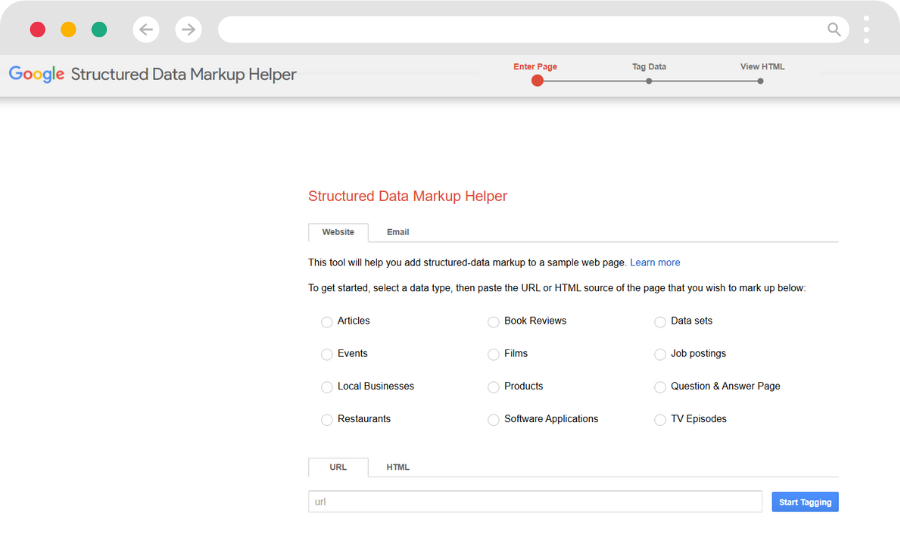
A tool to validate your website’s structured data, ensuring search engines recognise it.
- Pros:
- The tool is very easy to use.
- Also, it provides direct Google integration.
- Cons:
- Limited to structured data validation only doesn’t provide in-depth SEO audit.
- No comprehensive SEO insights.
System Requirements: The web-based tool can run easily on any browser.
Price: Free.
28. Sitebulb (Free Version)
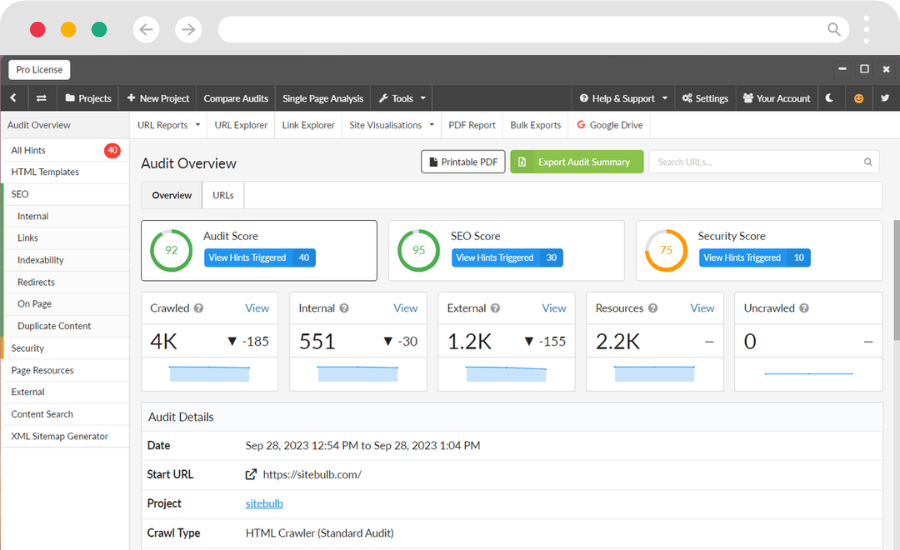
It is a desktop-based SEO audit tool that crawls your website and identifies SEO issues. The tool also provides actionable suggestions to improve your website’s performance.
- Pros:
- Sitebulb conducts detailed technical SEO audits.
- Provides easy-to-use visual reports.
- Cons:
- The free version limits crawling capabilities.
- Requires installation.
System Requirements: Windows, macOS.
Price: Free version available with limitations.
29. Neil Patel SEO Analyzer
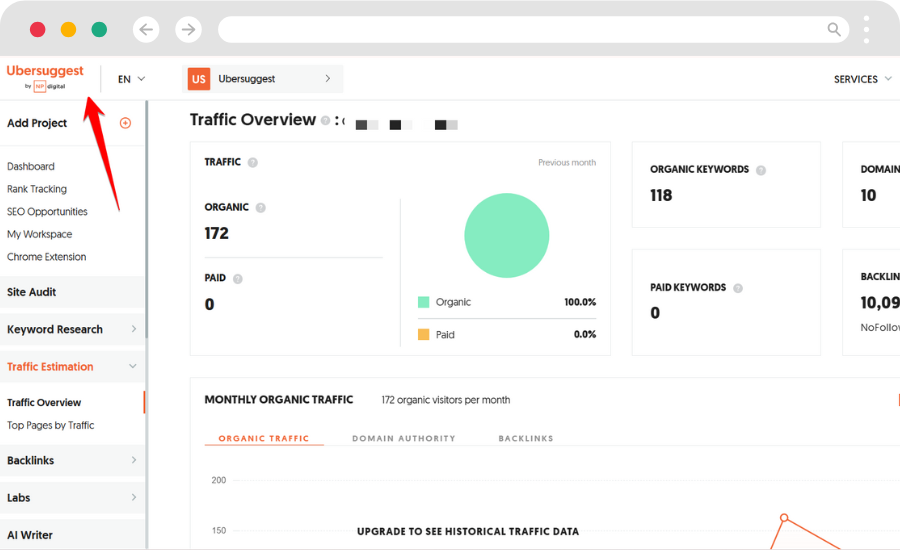
A free tool by Neil Patel that provides an SEO audit, backlink check, and keyword analysis.
- Pros:
- The tool provides comprehensive audit results.
- Includes keyword and backlink insights.
- Cons:
- Limited advanced features in the free version.
- Slower compared to premium tools.
System Requirements: Web-based.
Price: Free.
30. Fat Rank
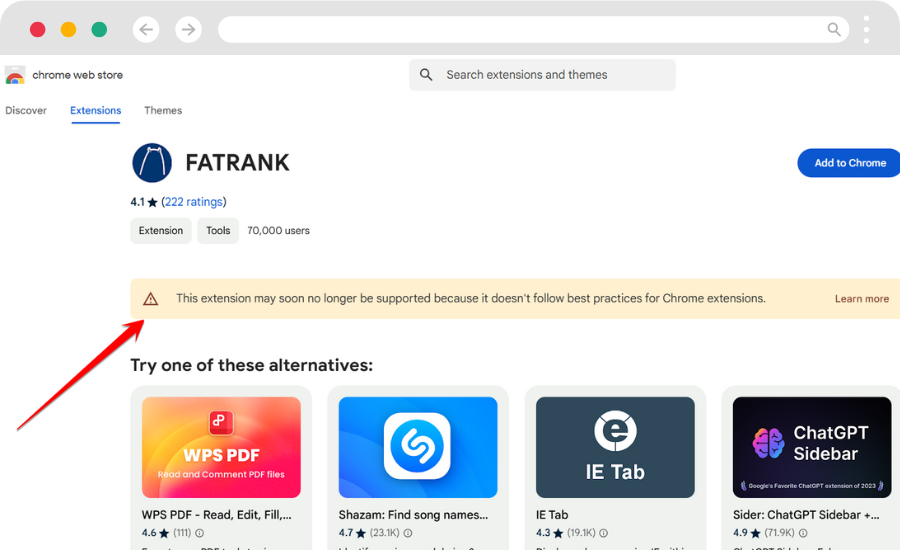
It is a Chrome extension that directly tracks your website’s keyword rankings in Google search results. This way, you can determine the real-time rank of your pages.
- Pros:
- Provides quick, real-time keyword ranking.
- The tool is easy to install.
- Cons:
- The tool is limited to keyword rankings.
- No backlink or technical SEO insights.
System Requirements: Browser-based.
Price: Free.
These were the top 30 free SEO tools for the website audit that you can use to improve the rankings and visibility of your website. Each tool comes with its strengths and weaknesses. Therefore, after analysing all the tools, you should choose the one that best suits your needs. While these tools provide a good hands-on experience, to use them to their full potential, you need expert help. Professional SEO services can help you prepare your SEO strategy, implement it, monitor it, and optimise it whenever needed. This way, you can focus on your core business activities while professionals drive your engagement.
Frequently Asked Questions Related To SEO Audit Tools
What are the best free SEO tools for website analysis?
Can I use SEO tools for free on my WordPress website?
Do free SEO tools offer website audit reports?
Are free SEO tools reliable for Shopify website analysis?
Tools like Ubersuggest and Google Search Console work well for Shopify websites, offering solid data on traffic and SEO performance.
What is the difference between free and paid SEO tools?
Free tools often have limitations in the number of audits, depth of analysis, or data availability compared to paid versions.






